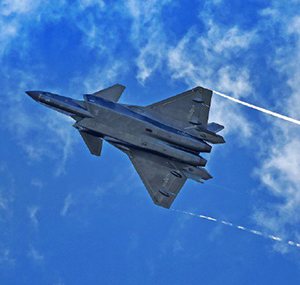Beijing, Dec 26: China has tested an improvised version of its stealth fighter and plans to sell it at half the price of the US variant to break Western monopoly over the high-tech aircraft, which will have strategic implications for India as Pakistan has already shown interest in acquiring it.
An improved version of China's fifth-generation FC-31 Gyrfalcon stealth fighter jet has conducted its maiden flight last week in Shenyang, capital of Liaoning province, state-run China Daily reported today.
Previously known as the J-31, the twin engine, radar evading aircraft is still under development by Shenyang Aircraft Corp, part of the Aviation Industry Corp of China, (AVIC), it said.
The Chinese stealth aircraft have strategic significance for India as besides China, Pakistan - which is producing JF-17 Thunder fighter along with Beijing - has already evinced interest in acquiring China's stealth fighter.
India is yet to have stealth aircraft in its arsenal. AVIC displayed a large-scale model of the FC-31 at the 14th Dubai Airshow in the UAE in November, 2015.
Specifications supplied by AVIC show the jet has a maximum takeoff weight of 28 metric tonnes, a flight radius of 1,250 kms and a top speed of Mach 1.8, or 1.8 times the speed of sound.
It can carry eight tonnes of weapons. The plane can hold six missiles in its internal weapons bay and another six under its wings, AVIC said.
The first test flight of the FC-31's second prototype took place on Friday at Shenyang Aircraft Corp, four years after the first prototype took to the skies, the Daily quoted officials as saying.
The report also said fifth-generation fighters are the most advanced available. Fu Qianshao, an aircraft expert with the PLA Air Force, said the new FC-31 has state-of-the-art instruments such as its electro-optical targeting system and helmet-mounted display and sight system.
The new FC-31 seems to have better stealth capabilities, improved electronic equipment and a larger payload capacity, said Wu Peixin, an aviation industry observer in Beijing said.
"Compared with the first FC-31, there are a lot of improvements on the second prototype. Changes were made to the airframe, wings and vertical tails, which make it leaner, lighter and more manoeuvrable," he said.
AVIC wants to use the FC-31 to capture market share at home and abroad but the company is making a big push to attract foreign buyers with its medium-sized stealth combat planes, he said.
Li Yuhai, deputy general manager of AVIC, previously said AVIC plans to use the FC-31 to "put an end to some nations' monopolies on the fifth-generation fighter jet" and this plane "is able to compete with any other aircraft of its kind".
"I believe the aircraft will have bright prospects in the market. Based on my experience and knowledge, I presume its price will be around USD 70 million, about half that of the US' Lockheed Martin F-35 Lightning II," Fu said.
"Moreover, the fourth-generation Euro fighter Typhoon and Dassault Rafale fighter jets are priced at about USD 100 million. All of these mean you can spend a lot less money to get an advanced, fifth-generation stealth combat plane," Fu told the Daily.
The only fifth-generation fighter jet currently available in the market is the US' F-35 Lightning II, but the US sells it only to allies.
Following the Friday test flight, aviation enthusiasts posted pictures on Chinese websites, showing what they said was the second prototype in flight.
The FC-31 was unveiled in October, 2012, when the first prototype made its maiden flight, becoming the country's second fifth-generation fighter jet following the J-20, which conducted its first flight in January, 2011.
Deliveries of the J-20 to the People's Liberation Army Air Force have started.






Comments
Add new comment